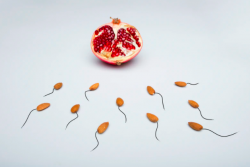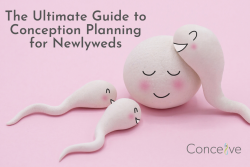Endometriosis may be an underlying cause in up to 50% of “unexplained infertility” cases. (1)
So how do I know if I have endometriosis?
Research shows we can lean towards a “yes” if you answer these 2 questions:
- Do you have pain with periods? (cramping pain in the lower abdomen occurring just before or during menstruation)
- Are you struggling with infertility?
If you answered YES to both questions, there is a 98% likelihood that you have endometriosis. (Specificity: 97.87%. On a more technical note, the sensitivity is only 20%, meaning that if you answered “no” to one or both, we still can’t say you *don’t* have endometriosis.) (2)
Other possible signs and symptoms of endometriosis:
- cyclic pelvic pain
- chronic pelvic pain
- painful vaginal intercourse
- painful urination
- painful bowel movements
- infertility
- heavy menstrual bleeding
- pre- or between- menstrual bleeding
- any cyclical pain affecting other organs
Checking off even some of these symptoms warrants a discussion with your healthcare provider and your fertility team.
For patients with no pain but still, in the unexplained infertility category, we can consider “silent endometriosis,” with research suggesting that 20-25% of endometriosis patients are asymptomatic. (3)
Potential red flags for “silent endometriosis” can be:
- recurrent miscarriages
- failed IVF attempts
- unexplained high FSH (follicle stimulating hormone) levels
- low AMH (anti-mullerian hormone) levels
- unexpected low egg numbers
- poor egg quality (4)
Diagnosis of endometriosis is notoriously difficult, especially with the limitations of the health care system where Conceive Health practices in Ontario, Canada.
A few more points on endometriosis
- The gold standard for diagnosis is laparoscopy – but wait times and specialist access make this difficult
- the average time to get a diagnosis is 7 years
- the bloodwork of a patient with endometriosis looks similar to a non-endometriosis patient. Same estrogen, progesterone, etc, unless the endometriosis is contributing to diminished ovarian reserve (or premature ovarian insufficiency, in which case you’d see low AMH and low AFC.
While it’s ideal to get a formal diagnosis and potentially excision surgery to overall improve fertility outcomes, if you suspect endometriosis, there is still a lot you can do right away. Naturopathic Doctors can treat endometriosis as if the diagnosis is confirmed. This means addressing inflammation, egg quality, and even pain/symptoms of endometriosis while trying to conceive.
If you suspect you have endometriosis and are trying to conceive, it is important to get help sooner rather than later, whether for assessment or fertility treatment. This is because endometriosis itself may have negative effects on ovarian reserve, egg quality and increase the time to pregnancy. (5)
What about ReceptivaDx?
This is a test that came on the market around 2017 and is slowly being used more by fertility clinics here in Canada.
It is an endometrial biopsy that looks for certain genetic markers which are highly correlated with endometriosis. Because it is an invasive test, it is typically done at the level of IVF, when a patient is a good candidate. More information is available on the Receptiva DX website. This is not something I have seen a lot of yet, but it seems promising and medically useful for changing the protocol for an IVF patient to improve chances.
To learn more about how you can support your fertility, or to book an appointment with a Conceive Health ND, contact us today.
References:
- (1) Meuleman C, Vandenabeele B, Fieuws S, Spiessens C, Timmerman D, D’Hooghe T. High prevalence of endometriosis in infertile women with normal ovulation and normospermic partners. Fertil Steril. 2009 Jul;92(1):68-74. doi: 10.1016/j.fertnstert.2008.04.056. Epub 2008 Aug 5. PMID: 18684448.
- (2) Nawrocka-Rutkowska J, Szydłowska I, Rył A, Ciećwież S, Ptak M, Starczewski A. Evaluation of the Diagnostic Accuracy of the Interview and Physical Examination in the Diagnosis of Endometriosis as the Cause of Chronic Pelvic Pain. Int J Environ Res Public Health. 2021 Jun 19;18(12):6606. doi: 10.3390/ijerph18126606. PMID: 34205332; PMCID: PMC8296507.
- (3) Bulletti C, Coccia ME, Battistoni S, Borini A. Endometriosis and infertility. J Assist Reprod Genet. 2010;27(8):441-447. doi:10.1007/s10815-010-9436-1
- (4) Dr Andrea Vidali https://preventmiscarriage.com/
- (5) D’Hooghe TM, Debrock S, Hill JA, Meuleman C. Endometriosis and subfertility: is the relationship resolved? Semin Reprod Med. 2003 May;21(2):243-54. doi: 10.1055/s-2003-41330. PMID: 12917793.
- (6) https://receptivadx.com/










